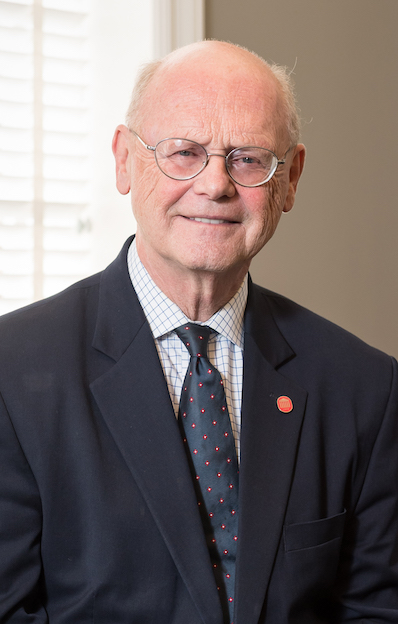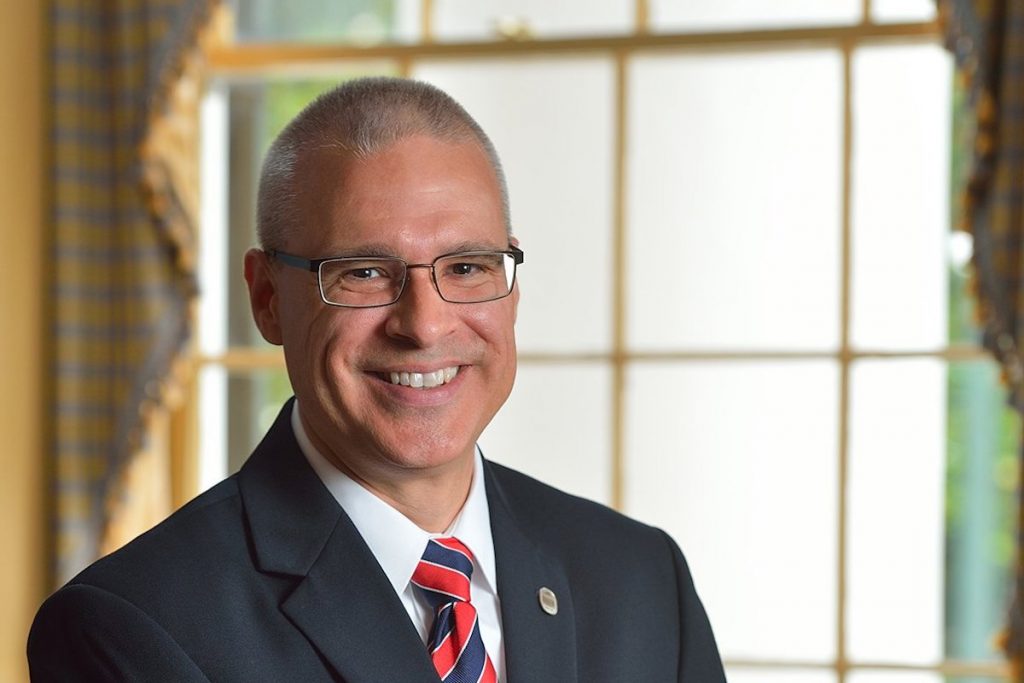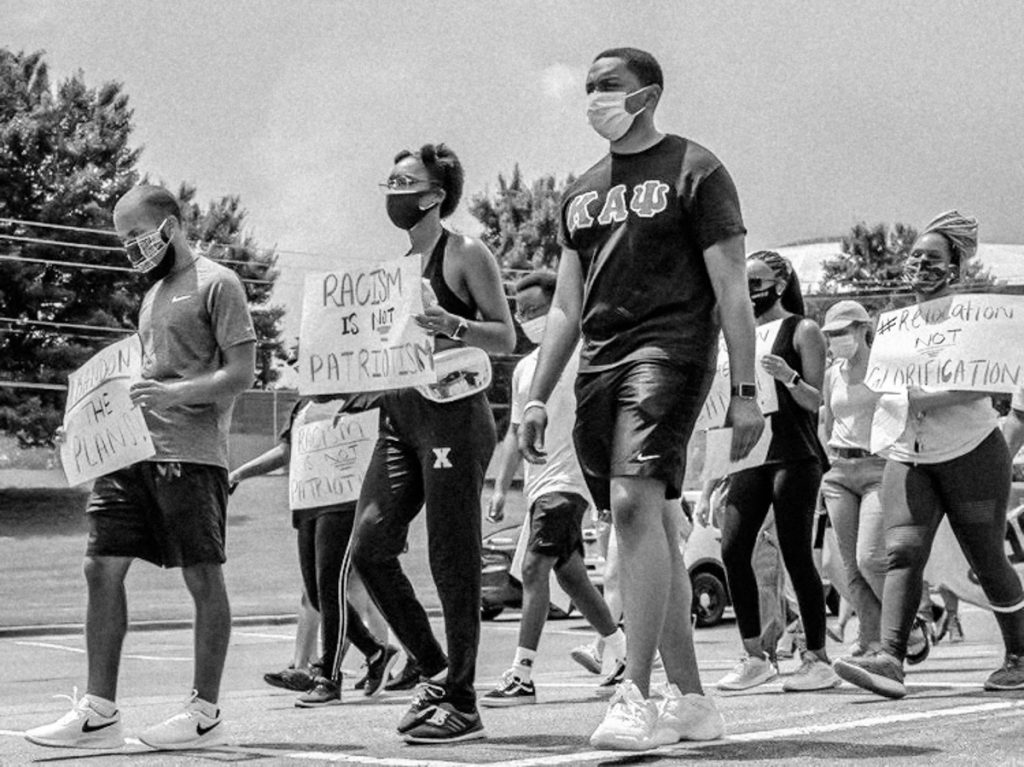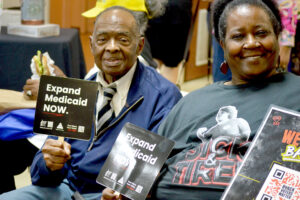“Anti-racist” training and a new approach to fundraising will be core parts of the University of Mississippi School of Journalism and New Media’s plans to change its culture after a Mississippi Free Press investigation reported on disparaging remarks about Black women students and a famous gay alum in its former dean’s emails.
The three-part “UM Emails” series reported numerous instances of ex-Journalism Dean Will Norton and other university officials ignoring overtly racist comments from wealthy alums who they sought to woo for donations, as well as knowledge by Norton and other journalism faculty of the identity of the man who took photos and videos of student, which another donor, Ed Meek, had distributed in social media.
Debora Wenger, who has served as the school’s interim dean since May, said in a statement on Wednesday that the school has “long embraced the idea that diversity, equity and inclusion are essential elements of any university education”—and particularly for those working in journalism or communications.
“While we remain distanced by COVID-19, we ask you to unite with us in the spirit to remake our school, university, state, country and world through the uncomfortable and hard work of examining our failures to realize our goal of promoting rich diversity, genuine equity and consistent inclusion,” Wenger wrote.
Her statement does not explicitly reference the journalism school’s most recent controversies, nor her predecessor’s role in them.
Wenger’s Aug. 12 statement does not go into detail about specific strategies to address the issues. A more fleshed-out plan is forthcoming, though, she said.
“We are starting over with what was previously called our ‘diversity plan,’” Wenger said. “It’s been in place since 2011 and needs to be recreated in recognition of its limitations and as a living, breathing document that can serve as a touchstone for our decisions.”
Wenger has declined an interview to discuss plans to enact solutions to the problems the UM emails story series revealed.
‘To Be Anti-Racist and to Be Allies’
Sources familiar with discussions inside the journalism school said that a few faculty members have pushed back against simple appeals to diversity and inclusion, arguing instead for the school to focus on “anti-racist” approaches. Anti-racism is a philosophy that focuses on proactively making choices in daily life to combat racism in ways large and small, rather than merely making warm gestures toward “diversity” and responding to and condemning only the most egregious acts of racism.
In her statement, Wenger wrote that the school is “scheduling more training for our faculty and staff to help us expand our understanding of what it means to be anti-racist and to be allies for those who have felt excluded in some way.”
The school also enrolled its first students in its new Political and Social Justice Reporting emphasis, Wenger said in the statement.
Near the end she tacitly referred to the MFP’s investigation of the emails between Norton and donor Blake Tart III.
“And in response to recent events that have highlighted another area where we need to be better, we are developing a ‘Statement of Principles for Fundraising’ that will guide our school as we work with donors going forward,” the interim dean said. “We are very grateful for those who value the quality education we strive to provide all of our students, and we look forward to involving even more donors who share our vision for what our school can be.”
That is the closest Wenger’s statement comes to acknowledging one of the core issues that the Mississippi Free Press’ “UM Emails” investigation revealed. Dozens of emails that this publication first reported showed that, even as former Dean Will Norton publicly condemned school founding donor Ed Meek for an offensive Facebook post that included photos of Black women students in September 2018, he was courting the support of another wealthy donor, Houston businessman Blake Tartt.
‘Back to Core Ole Miss Values’
Emails between Norton and Tartt, a 1984 alumnus, show that Tartt made the photos and sent them to Norton days before Meek posted them.
“I took this picture. … I went to check on my property,” Tartt wrote in a Sept. 17, 2018, email, with a photo of a Black woman walking in The Square in downtown Oxford attached. “You know Oxford and Ole Miss have real problems when black hookers are working on Jackson Avenue. The African American visitors from other towns were competing for her affection. It made me sick. All may think I am living in the past and not progressive enough. I happen to know what happens when a place is overtaken by the wrong elements.”
“Blake, I have been really disappointed for a long time with the way this culture is going,” the journalism dean wrote back the next morning.

Norton filmed a video publicly condemning Meek and calling for his name to be removed from the journalism school, which was then the Meek School of Journalism and New Media, on Sept. 21, 2018, after receiving the email from Tartt. Even after that, the dean continued courting Tartt’s support for the school, the emails show.
In another set of emails with an acquaintance, Norton discussed the sexuality of one of the school’s most famous alums, former Fox News host Shepard Smith. Norton, who had been in contact with Smith at the time to arrange a visit to the journalism school, wrote that he was concerned for his former student.
The Mississippi Free Press was the first to report that Tartt had taken the emails that resulted in Meek’s name being scrubbed from the “Meek School of Journalism,” and that Norton knew it even as he pushed for the name change.
Norton announced his resignation in April and stepped down in May as he expressed concern to other university officials that the emails could go public after an anonymous group, Transparent Ole Miss, obtained them through a public records request. That group and another, Ole Miss Information, shared the emails with this publication.
Neither the UM journalism school, nor Norton or the university have denied any of the allegations in the UM Emails series. Sources familiar with conversations inside the journalism school said faculty members have acknowledged that Norton was seeking Tartt’s help to obtain between $50 million and $80 million to help fund a new building for the growing journalism school in addition to other related projects. The money never materialized, and a Nov. 20, 2019 email that the journalism dean forwarded to Provost Noel Wilkin and Collegiate Athletics Vice Chancellor Keith Carter suggests Norton gave up on the prospect late last year.
“He has not contributed to our school despite our attempts to be kind to him,” Norton wrote.
On March 28, 2020, Tartt, who had long expressed anger to Norton over the school’s efforts to retire Confederate symbols and imagery, responded to a UM fundraising email, making clear that he had no intention to donate to the university.
“Are you crazy? Ole Miss no longer hold (sic) the values that made it so mighty and great!” the 1984 alumnus wrote this past spring. “Hopefully you are able to get the faculty, socialist (sic) and folks fighting Christianity to give to your campaign. Until we see real change back to core Ole Miss values, no money from this alumnus. Will urge ALL alumni to give nothing. Ole Miss has been destroyed.”
UM faculty in the development and athletics departments emailed back and forth about Tartt’s reply, trying to work out whether the businessman’s email meant school officials should stop reaching out to him in pursuit of donations. Matt Mossberg, the associate athletics director and chief development officer, offered his assessment.
“I have spent a lot of time with Blake and I’m not surprised at his response. … Unfortunately, there doesn’t seem to (be) an end in sight based on the things he wants ‘changed,’” Mossberg wrote to his colleagues. “We will continue to interface with him the best we can.”
UM Officials Decline to Discuss Plans
One issue UM faculty and leaders want to address, sources familiar with conversations at the university told the Mississippi Free Press, is whether top-level administrators will allow deans to nix potential donor prospects on the account of bigoted remarks or actions. Without such assurances, some at the school worry that even if Norton had cut ties with Tartt over his comments about Black women, another official, like the chancellor, could have overruled and even punished him.
In faculty meetings, the sources said, some members have cited times in the past when top UM officials told them that they had no choice when it came to working with wealthy potential donors, regardless of their objections. Some journalism faculty members suggested that they would like to see the school cut ties with Tartt or give him a “timeout,” the sources said.
Over the course of this investigation, the Mississippi Free Press has spoken to numerous knowledgeable sources who asked not to be identified for fear of reprisal.
Neither the university’s communications department nor the provost, Noel Wilkin, have agreed to requests to discuss the school’s plans to make changes with this publication.
“Thanks for reaching out to me, and I appreciate the offer,” Wilkin said in an email today. “As you know, we are consumed with planning for COVID-19 and the start of the school year. Also, I believe that I need to discuss our plans in Academic Affairs with our community directly before sharing them with outside groups.”

The provost did mention the MFP’s UM emails reports in a video message last week, however, although he avoided saying the name of this publication.
“Please know that I and the university administration condemn the appalling actions and hurtful, divisive comments described in these articles,” Wilkin said in an Aug. 7 YouTube video. “They are not reflective of who we are as a community, and certainly do not reflect what we expect from members of our university community. They do not represent who we want to be.”
In an emailed response to a request for comment, Wenger, the interim journalism school dean, pointed the Mississippi Free Press to yesterday’s statement.
A ‘Cycle of Crisis Management’
University of Mississippi Associated Student Body President Joshua Mannery and Black Student Union President Nicholas Crasta wrote an opinion piece for this publication following the UM email series in which they noted that the University of Mississippi has made “momentous strides both symbolically and substantially.”
“We love The University of Mississippi. If we didn’t, we wouldn’t be here trying to make it better,” the piece begins, before noting that they and other UM students have become “accustomed” to a “repetitive cycle of crisis management from the institution, especially in regard to race-related issues.”
“If the incident is large enough to warrant a public response, the university typically tends to acknowledge what happened and reaffirm the values that we all live by, noticeably lacking any next steps or actual substance. Often, that acknowledgement feels accompanied by a noticeable use of generalization,” Mannery and Crasta wrote. “This approach has, for so many students, felt like an intentional effort to minimize any damage to the UM brand rather than assuage the distress of those affected.”
The student leaders said UM leaders should implement greater “transparency,” more “accountability,” show better “allyship” from UM officials toward “marginalized student leadership,” and focus on establishing “a culture that openly and actively embraces diversity, equity and inclusion.”
Arielle Hudson, a 2020 University of Mississippi graduate and the school’s first African American woman Rhodes Scholar, as well as an advisory-board member for this publication, shared similar concerns in an opinion piece on Aug. 9 after the original series appeared.
“While the University of Mississippi has made some progress toward racial reconciliation by banning Confederate flags in athletic facilities, eliminating ‘Dixie’ from the band’s playlist, taking down the Mississippi state flag on campus and contextualizing some of its history, it has yet to begin a journey of racial healing that addresses the systemic issues still plaguing it,” she wrote. “That includes how all of these advancements are at the expense of years of labor and suffering of African American students, faculty and staff.”
‘We Are Committed to Being Better’
In her Aug. 12 statement, Debora Wenger, the interim journalism-school dean, noted that the school has made progress in recent years. She pointed out that its leadership team includes three Black women serving as assistant deans, and six of the school’s 32 permanent full-time faculty members are Black. The school has also worked with the university’s Center for Cross Cultural Engagement to conduct workshops to address “issues of diversity and inclusion,” Wenger said.
“I know of no other program on campus that requires all majors to take a diversity themed course in order to graduate,” Wenger added, noting that the journalism school has had that requirement as part of its curriculum “for years.”

Those efforts are not enough, though, the interim dean acknowledged in the statement, vowing to offer more than just lip service.
“We know it is easier to make statements about our intentions than it is to do the work required to achieve our stated goals,” Wenger said. “However, let us be clear, we are committed to being better—for our students, community and for ourselves.”
Editor’s Note: In the reporting of the UM emails series and follow-up reports, the MFP did not confer with members of either of our boards or any donors associated with the University of Mississippi to avoid conflicts of interest.
Also see: From Racist Emails to ‘Witch Hunts’: A UM Emails Timeline
Watch: Reporter Ashton Pittman and Editor Donna Ladd discuss the series during the 2021 Ancil Payne Award for Ethics in Journalism ceremony (40:00) and read more about the award here.
Read the full UM Emails reporting series to date:
- ‘The Fabric Is Torn In Oxford’: UM Officials Decried Racism Publicly, Coddled It Privately
- ‘The Ole Miss We Know’: Wealthy Alums Fight To Keep UM’s Past Alive
- UM’s ‘Culture Of Secrecy’: Dean Quit As Emails Disparaging To Gay Alum, Black Students Emerged
- ‘Appalling’: UM Provost Decries ‘Hurtful’ Emails About Black Women, Gay Alum
- Ole Miss’ Coddle Culture: Ole Miss Will Stay ‘Ole Miss’ Without Radical Shift
- EDITOR’S NOTE: The Decisions, Process, Motives Behind Ashton Pittman’s Series On UM Emails
- Perpetuating Patterns: It’s Time To Build A Better University Of Mississippi
- After UM Emails, Dean Plans ‘Anti-Racist’ Training, Donor Changes to ‘Remake Our School’
- ‘Ole Miss’ Vs. ‘New Miss’: Black Students, Faculty On How To Reject Racism, Step Forward Together
- UM Closely Guards Climate Survey Providing Window Into Social Issues, Sexual Violence
- UM Probes Whistleblowers Who Exposed Racist Emails As Ex-Dean Keeps $18,000 Monthly Salary
- ‘Our Last Refuge’: UM Faculty ‘Terrified’ As Officials Target Ombuds In Bid To Unmask Whistleblowers
- ‘Like He Was Disappeared’: UM Faculty Fear Retaliation After Ombudsman Put On Leave
- UM Appoints Acting Ombuds As Weary Faculty See Effort To ‘Stamp Out’ Anti-Racism Voices
- UM Retaliating Against Ombudsman for Protecting Visitors’ Privacy, Org Says
- UM Accuses Ombudsman of ‘Raising False Alarms’ Over Whistleblower Investigation
- A Matter Of Trust: UM Controversy Shows How Ombuds Programs Should, Shouldn’t Function, Expert Argues
- UM Pursuing ‘Criminal Investigation’ Into Whistleblowers Who Exposed Racist Emails
- Ombuds ‘Exonerated’ As UM Emails Whistleblower Hunt Fails to Identify Sources
- Will Norton, Ex-Dean in ‘UM Emails’ Race Saga, Quietly Departs University










